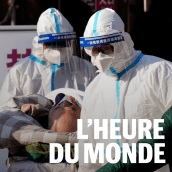At the end of December 2022, the old town of Lijiang is calm. Despite the three-day New Year weekend, tourists are rare in this popular city in Yunnan, a mountainous province in southern China. Only young people, most of whom are under 25, dare to venture into the quiet streets of this once crowded city. Many restaurants and shops are keeping their doors closed.
Also listen In China, the worrying outbreak of the Covid-19 epidemic
On the closed shutters of one of them, a small poster indicates: “Because we have a lot of sheep, we are closed this week. » In Mandarin, “sheep” (yang) is pronounced as “positive”, so much so that the term has become the affectionate name for people infected with Covid-19. As the country experiences its first massive wave since the abandonment of the zero Covid policy on December 7, 2022, both supply and demand are affected by the scale of the contaminations, which forces customers and employees to stay at home.
Result: after suffering from zero Covid all year 2022, the Chinese economy is now facing the virus itself. What lead to new major disruptions. During the New Year weekend, only 52 million trips took place across the country, a very slight increase compared to 2021 (+ 0.44%), but a decrease of 58% compared to 2019.
Lack of staff
The major difference is that, this time, economists and investors are optimistic: the situation should not last. Many predict a recovery after the Chinese New Year holidays on Sunday, January 22, or at least by the end of the first quarter. After a catastrophic year, which should see growth limited to less than 3.2% according to the International Monetary Fund, 2023 could see the return of more dynamic growth. On Thursday January 5, JP Morgan revised its forecast upwards, from 4.3% to 4.4%.
The country ended 2022 in pain: the PMI index of purchasing managers measuring industrial activity, published on December 31, points to 47, its lowest level since February 2020
The return of sunny days will only be possible when most Chinese have been infected and the population has acquired sufficient collective immunity. “For the moment, I don’t really see a difference with the period before the opening”, testifies Cheng Gequ, owner of a small hotel in Lijiang. “It’s even worse than before the opening”, lamented, for her part, at the end of December, the saleswoman of a traditional Shanghainese restaurant, equipped with an N95 mask (the equivalent of FFP2). Her clientele, rather elderly, holed up at home, for fear of being infected.
You have 55.95% of this article left to read. The following is for subscribers only.
